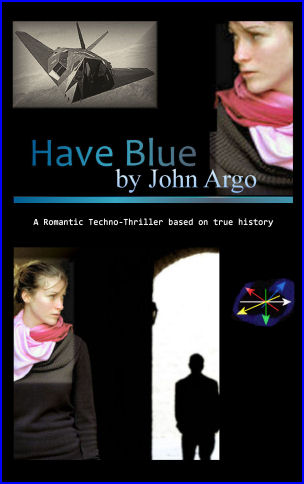One
 Absorption. That was the key word, the pot of gold, the holy grail, the buzz of the industry. Something was up, something big. Absorption. That was the key word, the pot of gold, the holy grail, the buzz of the industry. Something was up, something big.
As Paul Owens drove home from work at the Lockheed Skunk Works in Burbank, California on a November day, a young man in a red Mustang convertible, the wind over the Southern California desert was cool as it ruffled his thick, dark-brown hair, which hung down to his shoulders.
He was anxious to get home because... because... what?
Absorption. No, not that. Something else. The other thing.
Paul was an expert in the obscure science of radomes—jet nose cones made of non-interfering composites that were transparent to radar; and inside the radomes was the jet's radar tracking system. Paul was the best there was at this arcane specialty.
The air was silent except for the droning of small aircraft taking off and landing at Burbank's airport. Paul listened to rock music until the news came on—more disaster 9,000 miles away—and then flicked the radio off.
He did nose cones.
He did radar.
The Government and Lockheed denied that the place where he worked even existed, and he had a clearance as high as almost any general's; though his need to know was narrowed down to the mathematics and physics of the field that was his passion.
From a distance, there was little to reflect the ugliness of the Vietnam War, which was beginning to wind down, or the growing boldness of the Soviet Union in challenging the U.S. and her allies everywhere around the world.
Burbank, home of Universal Studios and several other cinematic giants, might not exactly be Heartland, U.S.A., but there was a peacefulness in the air, an Americanness, a safeness from war and chaos. Slightly inland, irrigation machines turned slowly in desert oases where vegetables lushly bloomed. There was a plantation slowness about the valley as laborers moved slowly about the fields, picking lettuce or spinach or fat round red tomatoes by hand.
A sense of urgency propelled him along this evening, but he'd put the cause of that urgency someplace where he could retrieve it. His head was full of mathematical formulations as he drove slowly to the Burbank subsection of Madeira, population 4,500, a bucolic swath of country living amid the suburbs. Paul was one of the world's experts on airplane nose cone radars. It was his passion, and he worked on it 24 hours a day, 7 days a week. The subject was always in his mind, whether he was home or at the Skunk Works. Lately it was absorption. The Government was desperate to make nose cones and fuselages that would suck up radar signals, refusing to allow them to return to whoever had sent them, and thereby rendering an airplane invisible. Would a metal do it? A paint? A material? Though Paul worked on other things as well, this was lately his pet project. It was a problem worthy of him, though he did not think of it that way.
He nosed in to a parking spot in the Madeira strip mall on the main route.
He picked up a BLT with extra mayo at King's Deli. His stomach was rumbling, and he realized he'd forgotten that he was hungry. Packing the brown bag absently under one arm, he jogged lightly several doors down to the small post office. He entered its gloomy interior—the fluorescents were already on, and the counter was shuttered behind steel slats. Eagerly, he bent down and peered into the tiny glass window of Box 4509.
"Yes!" He dropped his bag on the floor and fumbled with the key.
"Oh no!" It was a yellow notice, saying that he had a registered flat—what did that mean?—a package or something to pick up, but the post office was closed, and he'd have to come back in the morning. Damn!
The ZIP Code of origin... He rushed to the table by the wall, flipped open the book there, thrashed his way through the pages, and traced down the blinding rows of tiny numbers...MIT! Yes! His precious translation of the Russian mathematical paper was there on the other side of this damn wall, and he touched the wall with both hands as if he could somehow make it go away. But reality intervened. He'd be back when this place opened in the morning. He could wait one more night! He'd take it to work and work on it there! Unless his boss, Steve Rossi, who reported to Ben Rich, told him otherwise. Which was unlikely, since Paul usually worked many hours of overtime each week.
Minutes later, he pulled into his driveway, glad to be home while it was still daylight for a change. As he got out, the stillness and the smell of river reeds made him smile to himself. He walked through his old ramshackle house, picked up a can of cola on his way, and parked himself at the table on the back porch. As he devoured his sandwich, nearly groaning with the pleasure of not being in pain with hunger, he stared about his domain. He was paid well for what he did, and he'd chosen this quarter acre of delight because it reminded him of his farm origins in Ohio. His home was one of a string of quarter acre lots along Madeira Road. The neighbors were well separated, with huge old willow and pepper trees for added privacy. Running along the backs of the properties was a wide, shallow stream bed that was usually almost dry except for a trickle. Having that touch of wilderness added to the isolation and privacy he liked.
Much of Paul's backyard was waist deep in wild grass and oats. One day, he supposed, he'd have to get someone over to trim it. But what was the use, he thought, it would all grow back again. He thought again about his package. From the preliminary abstracts he'd read, he had a feeling that paper—by a Soviet professor, no less—might contain a clue in this maddening puzzle. Jeez, even the Nazis had toyed with the idea of radar-absorbent coatings during the last desperate days of World War II. They had designed and tested a remarkable V-shaped flying wing coated with materials that deadened the radar signal. Had the war continued a few more years, they might have found the complete answer, and then he, Paul Owens, would be chewing on some other problem today! He laughed to himself. Belching, he wandered over to the weather-beaten cupboard at the end of the porch, undid the padlock, and spread open the doors. There was his entire model airplane kit—enough to open a model airplane shop if he had time for such stuff. No, this was serious business. He'd loved these things since childhood—even had some engines dating back to his dad's fascination with the same hobby—but lately he'd been using his hobbies to help in his work.
The cupboard was full of tools, wings, fuselages, repair patches, dopes and paints and glues, oil, screws, model railroad parts (his other hobby)—and two working, radio-controlled planes.
Idly, he picked up one of his airplanes. He opened the tiny engine screw, poked an oil can nozzle inside, and squeezed the little can until the see-through indicator on the engine showed full. The engine took about as much oil as a fountain pen held ink. He closed the screw and wiped the engine with a red mechanic's rag. Adjusting the choke, he gave the propeller a good flick. The engine gave a healthy sput!—good compression.
He picked up the control, pulled the antenna fully out, and checked the battery. The juice was fully recharged.
Moments later, he stood just away from his back porch, controls in hand, watching his two-foot wingspan Condor buzzing over the high grass like a strange white dragonfly with black lettering.
It took him a minute or two to become aware of a child's voice speaking excitedly nearby.



|

 Thank you for reading. If you love it, tell your friends. Please post a favorable review at Amazon, Good Reads, and other online resources. If you want to thank the author, you may also buy a copy for the low price of a cup of coffee. It's called Read-a-Latte: similar (or lower) price as a latte at your favorite coffeeshop, but the book lasts forever while the beverage is quickly gone. Thank you (JTC).
Thank you for reading. If you love it, tell your friends. Please post a favorable review at Amazon, Good Reads, and other online resources. If you want to thank the author, you may also buy a copy for the low price of a cup of coffee. It's called Read-a-Latte: similar (or lower) price as a latte at your favorite coffeeshop, but the book lasts forever while the beverage is quickly gone. Thank you (JTC).
|
TOP
|
MAIN
Copyright © 1996 by John Argo, Clocktower Books. All Rights Reserved.
|